Glycerine is extensively used in various beauty products because of its moisturizing property, especially hair care products. It isn't easy to locate products that don't contain glycerine. But many naturals complain about how glycerine affects their hair; glycerine for curly hair can be a boon and a bane for your curls. While applying glycerine-based products, you should be aware of the dew point, your hair's porosity and other factors in achieving an amazing twist. Most curlies believe that glycerine gives your curls that extra oomph, isn't it? However, it isn’t always the truth.
In this article, we will explain, with reason, why and when it is appropriate to switch to glycerin-free products.
What effect does Glycerine have on your hair?
Glycerine (aka Glycerol) is an odorless, viscous, colorless liquid commonly used in hair products because of its moisturizing and conditioning properties. Glycerine acts as a humectant which draws moisture from the surrounding into the hair, keeping your curls soft, smooth and manageable. It attracts the water molecules from the air when it is in abundance in air, keeping your hair hydrated. Hydrated curls are structured and well-defined with better bounce and elasticity.
Glycerine is effective when the humidity is right. But, in low humidity or low dew points, when the air is drier than your hair, the moisture is pulled back from the hair into the surrounding, making curls look dry and frizzy. Due to this, humectants such as glycerine release water quickly, making your hair dry, brittle and frizzy in dry or winter weather.
Conversely, during high humidity, glycerine draws in more moisture from the surrounding into the hair, causing the cuticle layer to rise, causing frizz. Due to this reason, experts advise curlies to avoid humectants such as glycerine, sorbitol and propylene glycol in their curly hair products to avoid hair dryness and frizz.
But the good news is that you do not always have to depend on glycerine to maintain the beauty of your long, luscious locks. Other substitutes of glycerine work well for enhanced conditioning and moisturizing effect.
What are the substitutes of Glycerine for sustainable moisturization?

You don't always have to depend on glycerine for hydration. Other alternatives can provide increased hydration and are effective in all weather conditions. Let's Let's discuss other substitutes for glycerine for sustainable hydration.
1. Hyaluronic Acid
Hyaluronic acid is considered the best glycerine alternative as it improves your hair's hydration level by sealing the cuticle, which prevents moisture loss, thus reducing frizz and dryness in curls. It acts as an elixir for dry and damaged hair by pumping life into it. Many curly hair products have hyaluronic acid as their main ingredient.
2. Plant Gels
Plant gels are a natural alternative to glycerine, which effectively provides sustained hydration to your thirsty curls. Plant gels are known to form a thin film over the hair shaft, protecting your hair from water loss. Flax seed, pectin, okra, and hydrolyzed proteins are some examples of plant gels.
3. Propanediol
Propanediol or 1,3-propanediol, also known as "Naturesilk") is the preferred humectant when looking for a substitute for glycerine. It is a non-sticky, petroleum-free humectant, which helps improve the product formula's texture, effectively used in many curly hair products. It is an effective substitute for propylene and butylene glycol. It is believed to have the ability to enhance penetration (i.e. it allows better absorption of the product into the hair shaft.)
In addition, it is said to improve the efficacy of your preservatives in the product formula.
Propanediol is often used in conjugation with glycerine in many hair care products to improve the texture and appearance of your hair. Several moisturizing hair care products, such as hair creams and conditioners, often contain both ingredients.
4. Pentylene Glycol BIO
Pentylene Glycol BIO is becoming a popular humectant among many curlies. Be wary of the term 'glycol'. The term BIO is added because Pentylene Glycol BIO is derived from sugarcane, a renewable resource. This humectant is different from its petroleum-based counterparts.
Pentylene Glycol BIO acts as a penetration booster for active ingredients and is an excellent humectant and a glycerin substitute. It comes in a liquid form and is not as sticky as glycerine. It acts as a powerful solvent.
Pentylene Glycol BIO enhances the product's texture and feels, improving the user experience. As a result, the final product will be easier to spread.
5. Vegemoist
Beet Sugar extract could be another excellent alternative for glycerine. When humidity and dew points are the major concerns, Glycine Betaine or beet sugar extract is the best alternative to glycerine. Beet sugar extract is also known as Vegemoist. It'sIt's an anti-irritant, food-grade humectant, and promotes collagen production, improving the elasticity of your strands. Due to its hair care benefits, it is used as a conditioner, moisturizer, and detangler in many curly hair products.
The greatest benefit of beet syrup extract (Vegemoist) is that it hydrates directly rather than trying to pull moisture from the air. The 'saccharides' make it an excellent option as they can be used in any climatic conditions. Also, you don't have to be concerned about humidity.
6. Honeyquat
If you want to reduce static buildup and add shine to your tresses, then you should try honeyquat.
Honeyquat, also known as Hydroxypropyltrimonium Honey, is a common ingredient in many natural care products. Honeycutt, made from honey, exhibits excellent conditioning and moisturizing properties, due to which it is used in many hair care products. By reducing static, it makes your combing session hassle-free.
7. Natural Oil and Butters
Natural oils such as argan oil, castor oil, almond oil, and avocado oil provide better nourishment and hydration to your curls, making them soft, smooth and bouncy. It eliminates dryness and frizz from your hair.
- Argan Oil: Argan oil forms a protective coating over the hair shaft, thus protecting your hair from extreme climatic conditions, keeps your curls well hydrated by preventing moisture loss.
- Castor Oil: The high content of Vitamin E, Omega-6 fatty acid and minerals effectively tames your frizzy curls.
- Almond Oil: Conditions your curls, making it soft, smooth and shiny.
- Avocado Oil: This high content of Vitamin E adds smoothness and luster to your hair.
- Shea Butter: It is high in Vitamin A and E and aids in nourishing and hydrating your curls.
- Cocoa Butter: It acts as a conditioning agent. Apply a small amount of Cocoa butter after shampooing. It keeps your curls well-hydrated and assists in smoothening the hair.
You can pick whichever you prefer. Depending on the texture and condition of your curls, you can choose an ingredient which suits your hair the best.
Also Read :
All the content published on www.Curlvana.in is solely for information purposes. It is not a substitute for professional medical advice, diagnosis, or treatment. Always consider seeking the advice of your physician or a qualified health care provider. The information, suggestion, or remedies mentioned on this site are provided without warranty of any kind, whether express or implied.




